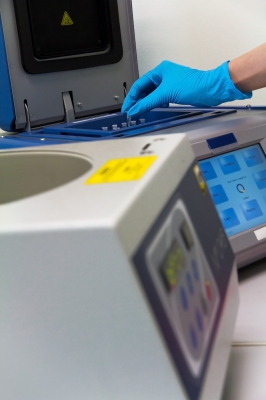What is a biotechnologist?
A biotechnologist is a scientist able to use biological systems to solve specific application problems as the study and diagnosis of diseases or the development of drugs and vaccines, both in industry and in academia and research. The biotechnologist typically operates in research laboratories, where it can play a role of specialised technical assistant or be involved at different levels in research projects aimed at understanding the physiological processes and the pathogenesis of diseases, the development and application of innovative methodologies for the diagnosis and therapy both in the human and animal world, to the development of new methods for the evaluation of the characteristics and the effects of drugs and foods. He can also work as part of diagnostic laboratories, in medical or veterinarian field. In other cases, the biotechnologist can perform office work or play activities at external sites, for example in contexts such as publishing and scientific information or quality assessment of molecules and analytical procedures.
What are his skills?

The biotechnologist is able to operate with cellular systems, proteins, nucleic acids, microorganisms, in the context of problems relating to basic scientific research, diagnostics in medical and veterinary fields, the evaluation of food products. He or she has considerable preparation in the basic disciplines such as chemistry and biochemistry, but combines these specific skills on the techniques of recombinant DNA and its applications in genetic engineering, molecular diagnostics, in genomic sequencing and computational biology. In trials the biotechnologist also acquires knowledge in different fields of basic and applied biomedical research, such as pathophysiology, microbiology, pharmacology, biochemistry and clinical molecular biology and can focus his attention on a large number of highly specialised areas.
What are the anticipated job opportunities?
The four curricula provided by the course, “Medical”, analyzing issues related to applications in diagnostics and human therapy, “Pharmaceutical”, oriented towards development issues and assessing the effectiveness of drugs, “Veterinary”, focused on applications in the field of animal disease and “Alimentary”, focused on issues related to the production and processing of food”, focus the study on as many specific aspects. Graduates in Biotechnologies for Health, also in relation to the chosen curriculum, will therefore operate at:
- research laboratories and public and private services;
- the national health system and similar structures of the European Union;
- industrial sectors aimed at producing bio-medical, pharmaceutical and diagnostic products;
- commercial or informational activities in the field of pharmaceutical industry and diagnostics;
- structures operating in biotechnological diagnostics (laboratory analysis);
- structures that carry out complementary activities to biotechnology, such as technology transfer, scientific publishing, environmental, forensic laboratories.
The professions mentioned above have been selected from the available database of current professions; however, in a growing field such as biotechnology it is to be expected that graduates will, in the future, be able to create new professional figures able to provide specific support in the medical-surgical field, in nutrition, in veterinary, etc ..
